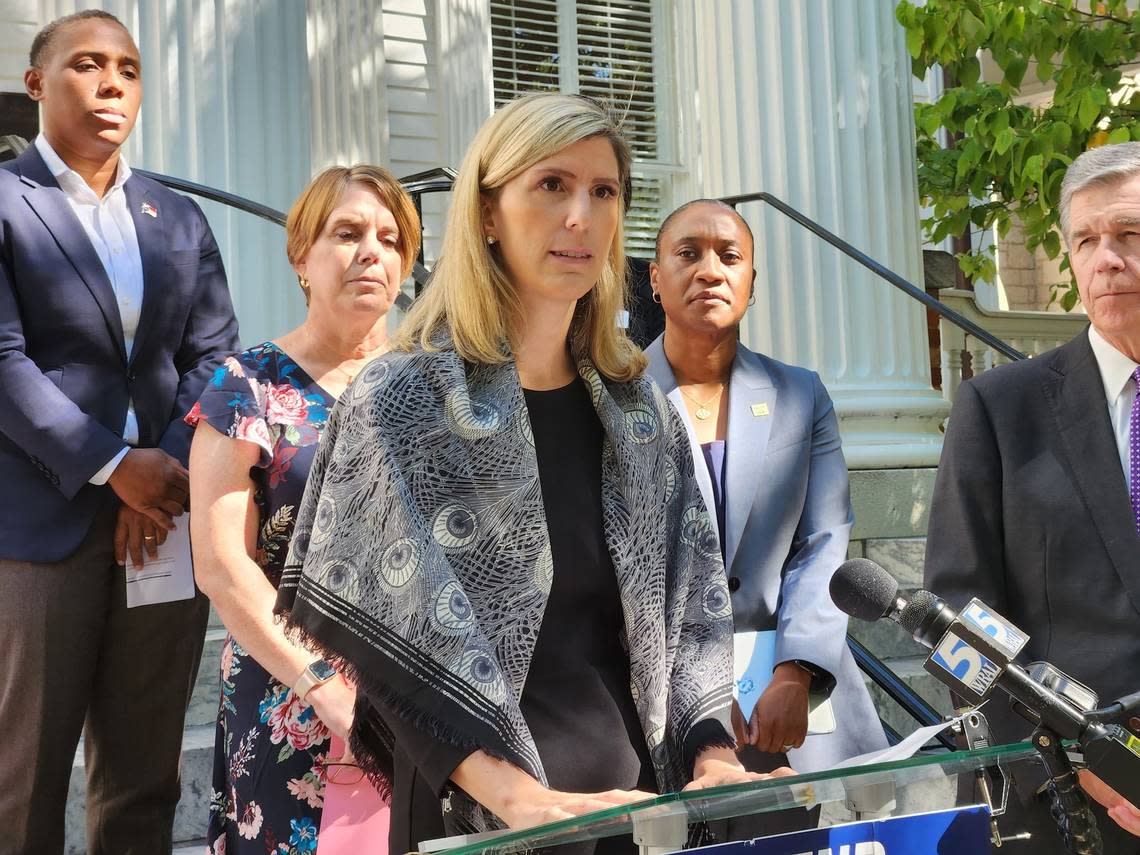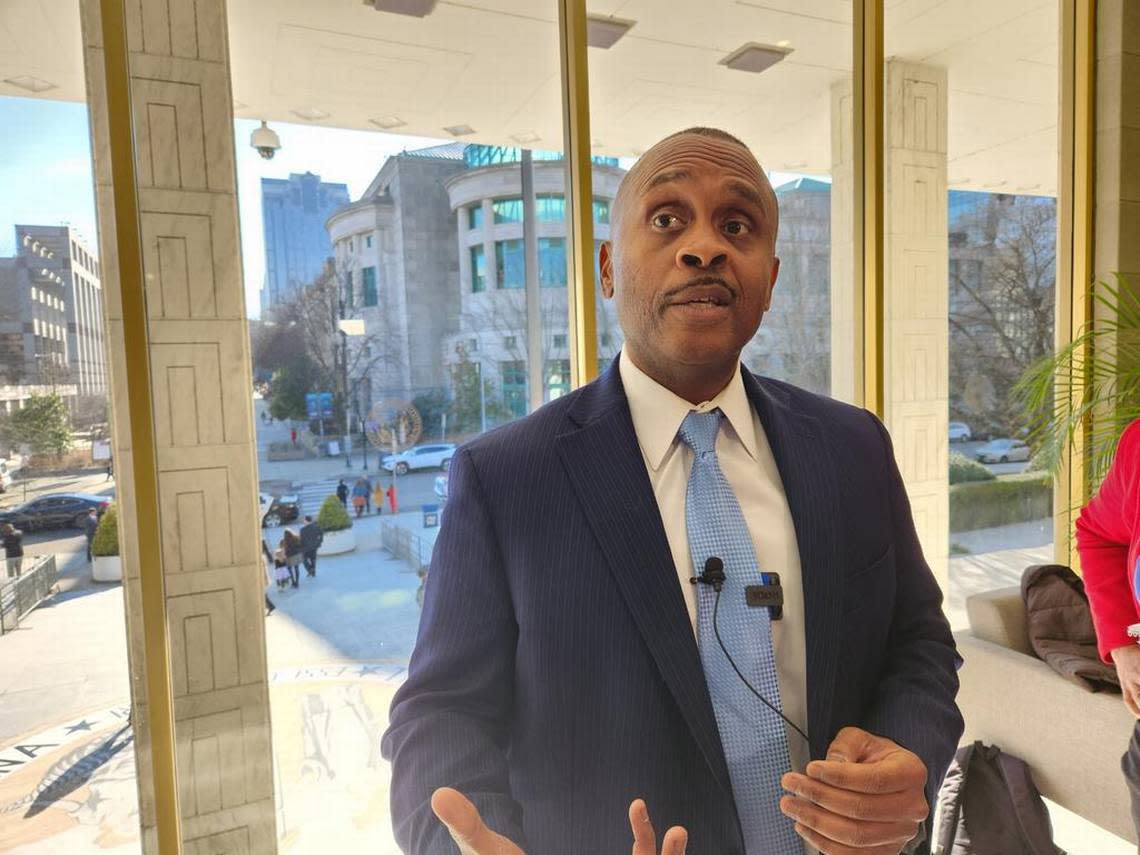Coming off 2022 losses, what a shift in the NC Democratic Party could mean for 2024
The election of the state chair for a political party isn’t usually big news. But the upset wins by Anderson Clayton and other leaders showed North Carolina Democrats wanted a change in direction for their party.
While Democrats did well nationwide in the 2022 election, they lost significant races in North Carolina, including ceding even more power to Republicans in the General Assembly.
The new party leadership Democrats elected are: Chair Anderson Clayton; 1st Vice Chair Jonah Garson; 2nd Vice Chair Kimberly Hardy; 3rd Vice Chair Elijah King and Secretary Melvin Williams. Their ages span generations, with Clayton and King the youngest in their 20s.
But is new leadership enough to address the shortcomings seen by some of the party faithful? Here are 10 ways Democrats might change their party this year:
1. No more unopposed races?
The 2022 elections would have left much of the Republican leadership in the General Assembly unchanged regardless of voter turnout. That’s because several races only had one candidate on the ballot, and it wasn’t a Democrat.
“We want to make sure we don’t leave seats uncontested,” Hardy, the new 2nd vice chair, said in an interview with The News & Observer. “Put Democrats on the ballot. That is critically important. We want to make sure that doesn’t happen again.”
2. Recruiting local, not just state candidates
Clayton had been chair of the Person County Democrats. N.C. Sen. Mike Woodard, a Durham Democrat who endorsed Clayton, said the new executive committee is “going to get our rural county parties excited. They’re going to work harder in identifying local candidates for local races and support them.”
3. Winning close races
“They’re also going to help with turnout,” Woodard said. Democrats have lost some close races. Republican N.C. Supreme Court Chief Justice Paul Newby defeated former Chief Justice Cheri Beasley for the job in 2020 with about 400 votes in a race that went to a recount.
“Because if you can increase (turnout) in some of these rural Republican-leaning counties, if you can get another 2-3% more Democrats there, then that’s the difference in Chief Justice Newby or reelecting Chief Justice Beasley, for instance,” Woodard said.
He said that if Democratic voting increases in 20 to 30 rural, suburban or exurban counties, “then these state races that are really close could swing blue.”
Even in urban areas, Democratic turnout in 2022 was lower than expected.
4. Battle starts now
In the days after Clayton was elected, she had a series of meetings with other Democrats. One of the first was Attorney General Josh Stein, who is running for governor in 2024.
Clayton shared a photo of herself and Stein on Twitter, saying he’s “ready to work with us and for us to make North Carolina a battleground in ‘24. From Canton to Crystal Coast, we know grassroots organizing will power our party forward. I’m so honored to work alongside him in this fight.”
Sen. Mary Wills Bode, a freshman Democratic lawmaker who won a competitive Wake County district, had coffee recently with Clayton.
“I’ve known Anderson for a couple of years now. And she just has this really infectious, can-do attitude that makes people want to roll up their sleeves and do the hard work,” Bode told The N&O in an interview.
“And I think that it’s going to be incredibly well-received across our state, and I think it’s going to be particularly helpful with our young voters across our state, and on our college campuses in particular,” she said.

5. Democratic establishment picks defeated
Clayton not only defeated the incumbent, Bobbie Richardson, but won despite Richardson’s big endorsements, especially from the de facto state party leader: Democratic Gov. Roy Cooper.
Hardy, the 2nd vice chair, said endorsements can be great but don’t guarantee a win. She once had President Barack Obama’s endorsement when she ran for the state House, but lost anyway, she said.
“I don’t think of endorsements as mandates,” she told The N&O in an interview. “What I think people are looking for is for the party to start winning, and sort of derail this Republican playbook used these past couple years.”
The sweep by new leaders wasn’t necessarily on the agenda. Hardy said that she and Garson ran together, but otherwise everyone stayed out of each other’s races.
“Our singular focus was just on our race,” Hardy said, so she didn’t “take the temperature” of how things were going with others, just had an understanding that whoever won would work together.
6. Organizing all year
Hardy said the new leadership has in common a desire for organizing — Clayton in rural areas and King on college campuses, for example.
“We’re looking at all manner of organizing, year-round,” she said.
Hardy said Democrats need to focus on increasing voter turnout, and not just during the election cycle. That means making sure Democrats don’t feel their votes are taken for granted, she said.
The new party leaders will interview candidates for the NC Democratic Party’s next executive director, involving a nationwide search. The person who gets the job will be leading an office that had layoffs at the holidays as well as a months-long delay in recognizing the party workers’ union.
7. Bottom up, not top down
So far, the only official candidate for North Carolina governor in 2024 is Stein. Republican Lt. Gov. Mark Robinson is expected to get in the race, but has yet to declare his candidacy.
Stein has been the heir apparent for a few years, expected to follow in the footsteps of Cooper, who also served as attorney general before running for governor. But both Cooper and Stein’s endorsements of Richardson weren’t enough for her to win.
One change that former Democratic Sen. Kirk deViere sees is the party letting leadership come from the bottom up, not the top down. That’s the message he sees from the election of new chairs.
“I think (other Democrats) spoke very loudly to the elected leaders of the party that we hear you and we respect you, but we want to go in a different direction. And I think those elected leaders need to step back and listen,” deViere told The N&O.
DeViere sees the new party leadership bringing new energy and shifting away from the “status quo controlling everything.”
DeViere lost his Democratic primary because of retribution from Cooper’s “political machine,” he has said. Cooper made the unusual move of endorsing deViere’s opponent, Sen. Val Applewhite, who went on to win and maintain the Democratic seat.
Republicans flipped legislative seats elsewhere in the state, coming within one vote of being able to override Cooper’s vetoes. Cooper told The N&O in December that Democrats’ legislative losses were because of unfair maps.
8. New energy
Rep. Robert Reives, the Democratic minority leader in the state House, said said both Clayton and her predecessor “care deeply” about the state party.
Reives said he now sees more “enthusiasm, and an energy” that he hasn’t seen in several years.
Bode is among 13 Senate Democrats who are women, which is a majority of their caucus. She could see that growing.
“I think that it just takes someone willing to step up and say, ‘Hey, I want to see if I can offer something to my party, to my county commission, to my state legislature, to the U.S. Senate.’ Anderson stepped up and raise her hand,” Bode said.

“I think that this is an exciting new opportunity for Democrats in North Carolina,” Bode said, particularly for younger voters.
“You’ve seen another young person in a in a position of power in our party. The value of that cannot be understated. Young people seeing themselves in this party, leading the party, is really exciting.”
9. Women still in the lead — at the party level
Clayton is the second woman in a row to serve as party chair.
Democrats’ top elected officials, however, are all men — Cooper, Reives and Blue, as well as Stein, who appears to be the party’s pick to be the next governor.
10. More money at the local level and for rural Democrats?
Whether rural Democratic candidates get support is about money, Reives said.
“You win elections on the ground,” Reives said.
“It’s really less about people not caring about rural Democrats. And it’s more about literally having the money to be able to, you know, finance campaigns in those areas and things of that sort,” he said.
That can be difficult, Reives said.
“It’s not hard to find somebody to run for a good Democratic seat. You know, the challenge is running in an area where it’s an uphill climb,” he said.

Woodard said the changes will allow the state party to go into rural counties and make county party organizations “feel like they matter.”
“Even if it’s just picking up one school board seat, one town council seat, getting a county commissioner seat back,” Woodard said. “And we’ve seen the trend where our boards of county commissioners have been going Republican over the last decade.
“But you know, you start winning some of those back, then people can see that they’ve got a chance.”
